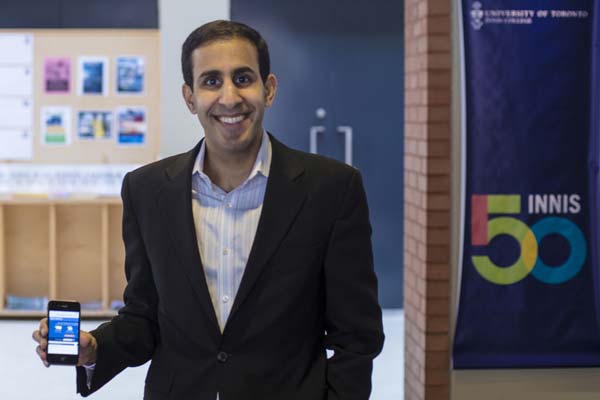
Spotlight on Startups: Teen Legal Helpline connects kids with lawyers, counselling and more
Published: March 3, 2014
Free, confidential and anonymous legal advice for teens who need it: it’s one of those things that seems like a no-brainer – a basic service to help a vulnerable population. But now, thanks to a U of T alumnus and his team of lawyer volunteers, the much-needed service is established, growing and changing the lives of kids in and around Toronto.
Matthew Boulos studied Computer Science, Peace & Conflict Studies and International Relations at the University of Toronto before completing a fellowship at the Massachusetts Institute of Technology and a law degree at Harvard. Though the business world called him, Boulos continued to stay deeply involved as a mentor with his church youth group in Scarborough, where the idea for Teen Legal Helpline came about. (Learn more about Teen Legal Helpline)
When one of the youth group members found himself in the middle of a criminal matter, Boulos realized he had the legal, business and tech network and know-how to help that teen, and others like him, get the help they deserved. And now Boulos and 10 lawyers are daily offering help to kids who are victims of crime, kids who may have committed a crime, and those who are caught up in family or immigration issues and need legal advice – all for free.
It’s simple. Teens visit the website, anonymously submit their legal question, and practicing lawyers (including U of T Faculty of Law alumni Ahmad Mozaffari and Andrew Furgiuele) offer a few minutes of volunteer time to provide confidential advice and information with an opportunity for follow-up. As Teen Legal Helpline continues to grow, so do its ties to other community support systems, such as counselling organizations, which further help kids connect with the assistance they may not be receiving at home or school.
In this latest instalment of the Spotlight on Startups series, Boulos explained to U of T News how problem-solving a need in his community led to the launch of a thriving social startup.
How did Teen Legal Helpline come about?
I grew up in Scarborough and almost every Friday I spent at the youth group of my church. When I came back to Toronto to start my career, I returned to that same youth group as a mentor. One of the boys in the group said to me, “I’ve been accused of a crime but don’t worry because the police have agreed that I can do a lie detector test.” Well, I was quite worried and I told him there was a problem, he needed to know what he was doing and make sure he didn’t implicate himself.
I put him in touch with a friend who is a criminal lawyer and they chatted for about 10 minutes. The boy got the advice he needed, it cost the lawyer almost nothing in terms of time, and it turned out that the accusation against the boy was false and since he didn’t implicate himself, it gave the police space to look into who had really done it.
I was happy for my boy but incredibly frustrated that if that if any one thing hadn’t been in place in the chain of events, he likely would have been in court defending a serious charge. I thought, we know there are kids who have very serious legal questions. We know that there are lawyers who don’t mind spending 10 minutes to answer them. If we can bridge this, we can change the lives of young people.
At first I thought I would start a call centre but young people said they wouldn’t feel comfortable calling someone up and spilling their life to a stranger – I found how you bridge those groups really matters. We needed kids to feel they could safely ask a question, and we needed that question to reside somewhere so the lawyer didn’t have to be there at the exact same time… and when you describe it that way, it almost obviously becomes an online messaging service, so that’s what we built.
How have you grown and adapted Teen Legal Helpline since it launched?
This has been a fascinating year where the first period was saying, “Does this work? Can this work?” We answered those questions very quickly. Lawyers were happy to do it, teens were asking questions, but overall the volumes were low. We were interviewed by CBC Metro Morning and profiled by CBC Hamilton but still the volume was fairly low.
We then started a campaign to get to know everyone who served young people in our target communities. That had the effect of giving us deep roots where we needed them. What changed everything was talking to guidance counsellors and social workers over the summer—that had an unquestionable effect on our volumes. Now we have great relationships with quite a few educators and we’re finding that they’re the best advocates. Their recommendations have led to steady demand for the service.
The next natural step is to build real partnerships and improve the quality of the service, which is being helped along by our being selected for something called The Cause School. This is a program where the Corktown Seed Co. lends their marketing, design and brand capabilities to help us solve pressing needs and also helps us to network. Because of them I can sit down with the Toronto Community Foundation, Metrolinx, etc, and get their counsel on what I’m doing. They’re helping us rebuild our front-end user experience and helping connect a network of organizations that serve. Because imagine if you catch a kid’s legal problems, and can then refer them to someone who can help with the other problems they’re facing.
Who are the volunteer lawyers you work with?
We have a fascinating bunch because they’re all highly skilled lawyers who do exceptionally well in their private practice but are eager to give back. For example, if you’re working as a family lawyer, you’ll often see situations where the young person is not represented – the family is falling apart but the young person doesn’t know what to do or how to manage the situation. I’ve heard repeatedly from family lawyers how wonderful it would be to serve those kids when they needed it, and that’s what motivates them.
Likewise, our criminal lawyers and our immigration lawyers, they care about the kids immensely. Their passion is humbling. They really serve and they give their time, they make sure the kids get the answers they need, and what more could you ask for? We found them through interested lawyers who knew other lawyers, and we just spoke to people. It was a very easy conversation. You think of a sales conversation as being a hard one – not with these guys. They can control how much they can help each week and it can change each week, so that allows them to be committed without feeling like it’s a chain.
How did U of T help prepare you for launching this kind of social enterprise?
I came here as a Computer Science and Philosophy student, though I graduated with a joint-specialist in Peace & Conflict Studies and International Relations along with the Computer Science major. I had passions but I don’t think I had a specific career in mind that I could translate those passions into – not yet. A great part of the U of T story for me was deciding what actually mattered to me and how do you grow into something or someone who can serve and be of value to others.
Computer Science was always fun for me but I didn’t really envision where it was going to take me. But what I had experienced while here was the idea that you take the skills that you gained and wait until you’re ready to apply them in a dramatic or interesting way. So I became a lawyer, but now I run a technology organization. If it wasn’t for my specific technical abilities, we couldn’t have built Teen Legal Helpline, and it would have just existed in the space of ideas.
Another big way U of T influenced me was through time spent wandering with friends through the quads; you begin to think about what’s the purpose of your life and what you want to go on and do. I won’t pretend I had it all figured out by my last year of U of T but the importance of recognizing the space where there’s passion and desire to serve but also a need for competency really came through as an International Relations major. It was all well and good to say you want to change the world, but it was another to actually have the ability to do that. And to be able to temper idealism with reality in a way that doesn’t crush your idealism, that’s something I learned the value of at U of T that was really important to my formation and to my current story and what I do now.
I think sometimes people take service and say that’s at odds with the business world and technical skills, but it’s quite the opposite. You can’t serve if you don’t have the capacity to do it. That was all formed at U of T and was the foundation of me becoming a lawyer, later becoming a businessman, and this is how I can direct it now at this stage in my career.
Brianna Goldberg is a writer for U of T News.
About the Spotlight on Startups series
Spotlight on Startups profiles the many entrepreneurial efforts growing from the hundreds of companies spun out from research and connections sparking every day at the University of Toronto:
U of T hosts more than 50 enterprise-fostering courses, programs, labs, clubs, contests and speaker series across its faculties, departments and campuses — and then there are all the innovations developing in informal settings. U of T ranks No. 1 in North America for number of startups launched. And its roster of spin-off companies driving innovation in Toronto and around the world continues to grow.



